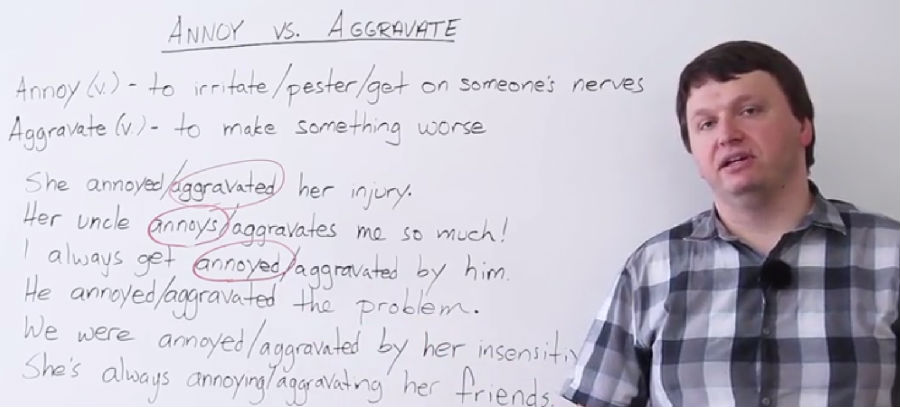(单词翻译:单击)
Hi guys. I'm Alex.Thanks for clicking, and welcome to this vocabulary lesson on: "Annoy vs. Aggravate".
大家好,我是Alex。感谢点击,欢迎收看这次的词汇课,我们来讲'Annoy'和'Aggravate'的用法。
These two words are often confused, even by native speakers.
即便对于母语使用者来说,这两个单词也经常用混。
And many native speakers don't actually think there's a difference between the two words.
而且有许多母语者都不觉得这两个单词之间有什么差别。
Well, today, I'm going to show you the difference between them.
今天,我就来给你们讲一下这两个单词的差别。
So, very simply: "annoy" and "aggravate" are both verbs.
很简单,'annoy'和'aggravate'都是动词。
They can also act as adjectives actually if you add: "ed" or: "ing" to them.
在这两个单词后面加'ed'或者'ing'的时候都可以当做形容词使用。
But, "to annoy", this word is the one that most people understand the meaning of it.
'to annoy'这个词很多人都知道什么意思。
So: "to irritate/to pester someone/to get on someone's nerves".
"to irritate/to pester someone/to get on someone's nerves",是某人生气。
Now, again, this...This is an idiomatic expression which means to annoy a person.
这是激怒某人的习语用法。
So if I say: "She gets on my nerves", she annoys me, irritates me, makes me "err", angry because of something that she does or something he does.
所以如果我说:“She gets on my nerves”,就是说,她(他)做的某件事让我很生气。
Now, "aggravate".Many people think that "aggravate" is actually a synonym for "annoy", that it has the exact same meaning as "annoy", and we use it the same way as "annoy".
下一个,'aggravate'。许多人觉得'aggravate'就是'annoy'的同义词,意思完全相同,用法也完全相同。
This is actually incorrect.Now, "to aggravate" something means to make it worse. Okay?
这其实是不对的。'to aggravate'是说让事情变得更糟糕,明白吗?
So, usually when you aggravate something it's always a situation, a problem, a physical injury. Okay?
当你aggravate某件事的时候,一般是某一个状况、问题或者是创伤。
So if you make something worse, a situation worse, a problem worse, a physical injury worse, you're aggravating it. Okay?It's not the same as annoy.
如果你让某件事(情况、问题或是创伤)更糟糕了,你就是在aggravating这件事,明白了?跟annoy不尽相同。
So, let's look at the sentences and decide which word we should use to complete each one... Each sentence.
我们来看看这几个句子,选一下该用哪个单词完成句子。
Now, the first one says: "She annoyed/aggravated her injury."
第一个, "She annoyed/aggravated her injury."
Now, if you were listening to me just now, you clearly know that here we should be using: "aggravate". Right?She made her injury worse.
如果你刚才听到我讲的内容,你就会很清楚的知道这里该用'aggravate'。她让她的伤口更加严重了。
So maybe she had a...A shoulder injury and she decided to do some really extreme exercise, and then: "Uhh", her injury was aggravated.
有可能她伤到了肩膀,她又决定去做一些非常剧烈的运动,她的伤就会更加严重了。
She aggravated her injury, she made it worse.The second sentence says: "Her uncle annoys/aggravates me so much!"
她加重了伤势。第二个句子,"Her uncle annoys/aggravates me so much!"
Now, if you're a native speaker, you might think: "Well, you can use both of them. There's nothing wrong with that."
如果你是一个英语母语者的话,你可能会想:“这两个都可以用,没问题的。”
Actually, there is something wrong with it if you want to get very technical and the meaning of the two words taken literally.
实际上,如果你仔细探究这两个单词本身的含义,就会发现问题。
You have to use: "annoy" in this situation."Her uncle annoys me so much!" Irritates me.
这种情况下,你应该用'annoy'。"Her uncle annoys me so much!" 让我很生气。
Okay? Let's continue: "I always get annoyed/aggravated by him."
好,继续,"I always get annoyed/aggravated by him."
So, again, this is similar to the second sentence where you're talking about someone who is irritated by another person.
这个句子和第二个句子很像,在说某人被另外一个人激怒了。
Here, we're seeing the adjective form. Right?
这个句子中我们看到了形容词形式,对吧?
So: "I always get annoyed or get aggravated, become aggravated or annoyed by him."
"I always get annoyed or get aggravated, become aggravated or annoyed by him."
Really, we should be saying: "annoyed" which means irritated.
我们应该用'annoyed'表示激怒某人。
Next we have: "He annoyed/aggravated the problem." So whatever the problem might be...
下一个,"He annoyed/aggravated the problem." 不管是什么样的问题……
Again, if you remember back to my initial explanation about aggravating problems, injuries, situations, you will know that here we should be using: "aggravate". Okay?
如果你还记得我最一开始对aggravating的解释,那你就应该知道在这里我们应该用'aggravate'。
He made the problem worse.Next: "We were annoyed/aggravated by her insensitivity."
他让问题更糟糕了。下一个,"We were annoyed/aggravated by her insensitivity."
Now, again, here, she made an insensitive comment, this really irritated us. Right? It didn't make us worse.
她漠不关心的言论真的激怒了我们,而不是让我们更糟糕了。
Although, again, if you really want to get technical: yeah, you could make a person worse, I suppose,
如果你想严谨一些的话,你可以说让某人更糟糕,
but really "annoy" is the more common, more correct word that you should be using here.
但是'annoy'在这里更常用更合适。
Next: "She's always annoying/aggravating her friends."Now, is she making her friends worse or is she irritating them?
下一个,"She's always annoying/aggravating her friends."她让朋友们更糟了,还是在激怒他们?
I think in this situation, you...Your meaning most of the time when you're saying a sentence like this means that she's irritating them, pestering them, getting on their nerves.
我觉得这种情况下,大多数时候你说的都是她激怒了他们。
So: "She's always annoying her friends."Now, let me talk about something with you guys.
"She's always annoying her friends."我再来给大家讲一点东西。

With words like this: "annoy" and "aggravate" where many native speakers don't even know that there is a difference between the two words, if you say: "Oh, she aggravates me so much."
像'annoy'和'aggravate'这种单词很多母语者都不知道二者之间有区别,所以如果你说:"Oh, she aggravates me so much."
It is in common usage.Most English native speakers don't know this rule, so if you misuse "aggravate" and mean "annoy" in your sentence, don't feel too bad about it. Okay?
很常见。很多英语母语使用者都不知道这条规则,所以如果你错用了'aggravate'来表示激怒别人,别觉得不对。
Just know that, technically, there is a difference between the two words.
只需要知道,严格意义上来说,这两个单词有差别。
We should not be using them interchangeably, although if you do, know that many native English speakers do the same thing.
我们不应该换着用,如果你用了的话,要知道很多本土母语者也这么用就好了。
So, if you'd like to test your understanding and really get the meaning of "annoy" and "aggravate", you can check out the quiz on www.engvid.com.
如果你想要检测一下自己的理解,并且深入学习'annoy'和'aggravate'的用法,请登录www.engvid.com做测验。
Good luck with that.Take care, and I'll see you guys soon.Don't forget to subscribe to my YouTube channel. See ya.
祝你好运。下次见啦。别忘了订阅我的YouTube频道,拜拜。


